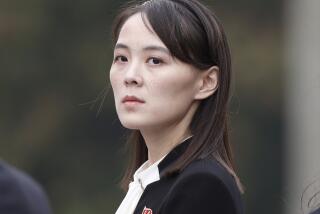Japan Calls North Korean Weaponry Development a Threat
- Share via
SEOUL — The Japanese government, in a defense white paper approved Friday, for the first time called North Korean weaponry development a grave threat to Japan. North Korea, meantime, resumed its propaganda attacks on South Korea.
The flurry of charges interrupted a mourning period leading up to the funeral of North Korean President Kim Il Sung and underscored the continuing tensions in northeast Asia.
The funeral, initially scheduled for Sunday, was postponed until Tuesday, according to an announcement today by official North Korean media. The statement said the delay would allow more people to pay their respects.
Japan’s Cabinet approved the long-planned annual defense policy paper a week after Kim died of a heart attack and eight days before Socialist Prime Minister Tomiichi Murayama is to visit Seoul.
The report said North Korea is believed to have acquired chemical and biological weapons and is suspected of developing nuclear bombs to go along with a proven missile capacity. “The situation on the Korean peninsula has become a grave destabilizing factor for the security of East Asia, including Japan,” the report said.
It noted that in May, 1993, North Korea successfully test-fired a missile with a range of 620 miles, meaning the device would be capable of striking Osaka. Pyongyang also is believed to be working on a longer-range version that could reach Tokyo and most of the rest of Japan.
“If the development of nuclear weapons is matched by the development of missiles, this could pose a more dangerous situation,” the white paper said.
Hirotsugu Ota, counselor at the Defense Agency in Tokyo, said Japan “would have to consider measures in the future if North Korea went ahead with its missile development.” He did not elaborate, but his statement apparently referred to the development of an anti-missile system. The United States has offered to work with Japan to produce weapons capable of shooting down incoming missiles.
Earlier this year, the Japanese government declared that Tokyo would not seek a nuclear arsenal of its own even if North Korea developed nuclear weapons.
As for the resumed propaganda attacks by North Korea on South Korea, Pyongyang condemned Seoul for ordering a military alert immediately after the announcement last Saturday of Kim’s death and for banning its citizens from offering condolences. It compared the alert order with “rashly igniting a fire at a funeral home.”
“Far from sharing sorrow at the unexpected misfortune on the threshold of North-South summit talks, the South Korean authorities abused (Kim’s death) politically and provoked their fellow countrymen (in the North) who have lost the leader of the nation,” the North Korean Central News Agency commented. It said that South Korean President Kim Young Sam, who had been scheduled to meet the North Korean dictator July 25-27 in Pyongyang, “cannot be called a human being, still less a politician.”
On Monday, North Korea notified the South that a first-ever North-South summit would have to be “postponed.” Its condemnation of Kim Young Sam was the first since the death of Kim Il Sung, who is expected to be succeeded by his 52-year-old son, Kim Jong Il.
Meanwhile, Kim Young Sam and President Clinton agreed in a 20-minute telephone conversation to continue tripartite U.S.-Korea-Japan consultations to deal with North Korea’s suspected development of nuclear weapons and any changes in circumstances on the Korean peninsula.
More to Read
Sign up for Essential California
The most important California stories and recommendations in your inbox every morning.
You may occasionally receive promotional content from the Los Angeles Times.













